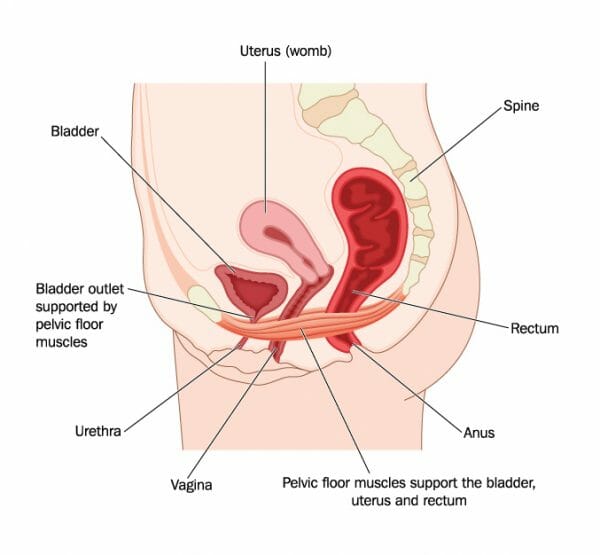The pelvic floor is composed of a group of muscles that extend between the pelvic bones and make up the lower section of the deep core. The main function of these muscles is to support the pelvic organs such as the bladder, uterus, rectum, and prostate.
Additionally, they work together to maintain continence and provide optimal bladder and bowel function. These muscles work alongside the deep core muscles, low back muscles, and diaphragm to provide optimal support throughout your daily activities. Similarly, to other muscles in the body, dysfunction can occur in the pelvic floor muscles.
Pelvic Floor Dysfunction Classifications
There are a few main classifications of pelvic floor dysfunction.
— There can be hypertonic pelvic floor dysfunction which is referring to a state where the muscles are constantly active resulting in increased tension within the pelvic floor. When the muscles are chronically tightened it impacts the muscles’ ability to contract optimally and support the pelvis in accepting repetitive loads.
In these hypertonic situations, it can result in symptoms such as urinary frequency or hesitancy. It is also common to get pain referrals from the pelvic floor into the lower back, groin, hip, and pelvic regions.
— The muscles can also take up a hypotonic state where they are lengthened, and this also influences the ability to provide optimal stability within the pelvis and surrounding areas. Some symptoms that may be experienced in this classification are incontinence, organ prolapse or heaviness within the abdomen.
The muscles in the pelvic floor can also have decreased strength or endurance which impacts their ability to provide support to the pelvic organs, work as a part of the deep core and provide stability within the pelvis.
— Lastly, there can be a classification where the muscles are not working in a coordinated manner which impacts the ability to work as a part of the core and can result in pain and dysfunction in the pelvic area.
Pelvic Floor Treatment in Cypress Physiotherapy in North Vancouver
To assess and treat the pelvic floor, Cypress physiotherapists in North Vancouver are required to complete additional education and training for external and internal assessments and treatments that are specific to the pelvic floor.
Those who are experiencing incontinence, pelvic organ prolapses, pelvic pain disorders, pre-natal and post-partum pain, prostate disorders, erectile dysfunction, chronic low back pain, and IBS may benefit from seeing a pelvic floor physiotherapist. Pregnancy including prenatal and post-partum periods are also key times when pelvic floor physiotherapy is beneficial.
During pregnancy, the women’s body moves through a variety of different stages to support and deliver the growing baby. Each of these phases requires continual changes within the body and the pelvic floor has a harder job due to the added weight of the growing baby.
Pelvic floor physiotherapy is an extremely valuable tool to help guide you through the various stages of pregnancy and provide you with the right tools to support your pelvic floor during and after the pregnancy and can help to safely transition you back into exercises and a variety of activities.
Additionally, pelvic floor physiotherapy can be a valuable tool for those who have experienced abdominal surgery or who are participating in high-impact or loading activities such as sports.
What to expect during your Women’s Health appointment in Cypress Physiotherapy in North Vancouver?
During your appointment, our Cypress therapist in North Vancouver will provide an assessment that is individually tailored to you and your pelvic floor. This will include gathering a detailed history from you and spending some time to identify any underlying causes of your pelvic floor pain or dysfunction.
From there we will perform a detailed assessment of your pelvic floor which may involve assessing the muscles in terms of their strength, endurance, and flexibility. The assessments are often completed externally or internally using a variety of manual therapy techniques to gain a better understanding of the dysfunction and the classification of pelvic floor dysfunction.
Our Cypress physiotherapists in North Vancouver will also assess the rest of your body and your organs to look for any contributing elements related to your pelvic floor dysfunction or to determine if the pain in these areas is due to a referral from the pelvic floor.
To treat your pelvic floor, we will use physiotherapy treatment techniques which will be guided by the assessment. Exercise therapy is often used to strengthen the weaker muscles and improve the coordination of the muscles to help get them to work better together and alongside the deep core.
Other exercises will be aimed at relaxing and lengthening the tightened muscles in order to improve their function. The physiotherapist will be able to choose appropriate exercises to improve the function of your pelvic floor by combining their extensive knowledge with the information gained during the assessments.
The physiotherapist may also use manual therapy on the pelvic floor or on surrounding muscles and joints. Additionally, they will be able to provide you with education on topics related to your individual pelvic floor presentation.
The number of appointments you may need will vary depending on the condition you are presenting with, how you respond to treatment, and the length of time you have been experiencing symptoms for. Your Cypress therapist will continue to assess and monitor you as you progress through your treatment and adjust the techniques appropriately.
By understanding the orthopedic and biomechanical underpinnings of how the body works, we can selectively employ the right techniques and create a sustainable and effective care plan to help you get back to full, pain-free functioning and participating in the things you love.
Call or go online to book an appointment for your pelvic floor dysfunction with Cypress Physiotherapy and Health in North Vancouver.



